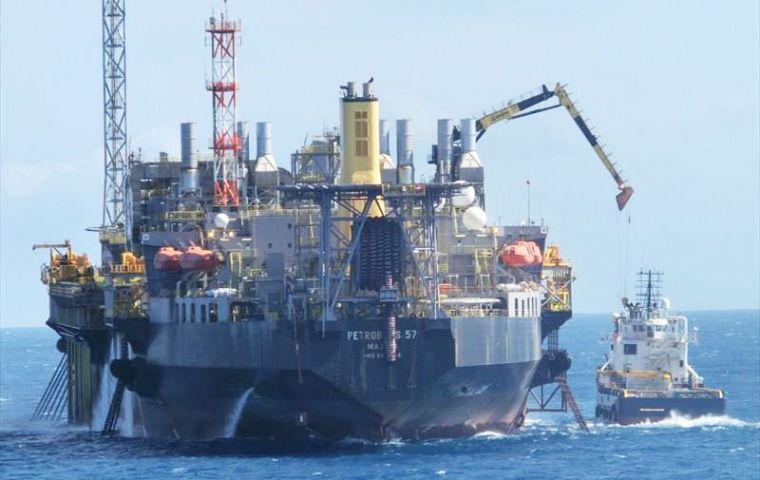MercoPress. South Atlantic News Agency
Falklands' oil industry expected to receive an FPSO by 2022
 Brazil leads the South American market with 24 planned and announced FPSOs, followed by Guyana and the Falkland Islands with one FPSO each.(Pic M Sitek)
Brazil leads the South American market with 24 planned and announced FPSOs, followed by Guyana and the Falkland Islands with one FPSO each.(Pic M Sitek) A total of 55 planned and announced floating production, storage, and offloading units (FPSOs) are expected to begin operations by 2022 worldwide, according to a report by GlobalData. In the South American list Brazil figures with 24 FPSOs, plus the Falkland Islands and Guyana with one each.
According to the report, titled Quarterly Global FPSO Industry Outlook, Angola leads FPSO deployments in Africa, four FPSOs were postponed worldwide at the start of this year, with no new FPSOs having been announced, stalled, or cancelled since the earlier report was published in October 2017.
South America is found to be leading with the highest number of planned and announced FPSO additions by 2022 with 26. This region is followed by Africa with 13, while Asia and Europe stand third with five FPSOs each.
Brazil continues to lead with 24 planned and announced FPSOs by 2022, followed by Nigeria with three and Angola having two.
Among operators, Petrobras is found to be leading with 20 planned and announced FPSOs, followed by Saipem SpA, Statoil ASA, and Modec Inc with three FPSOs each by the forecast period.
Brazil leads the South American market with 24 planned and announced FPSOs, followed by Guyana and the Falkland Islands with one FPSO each.
The African region has a total of 13 planned and announced FPSOs expected to come on-stream by 2022. Angola has the highest number of FPSOs expected to start operations in the region with four, followed by Nigeria with three.
Five planned and one announced FPSO are expected to begin operations over the next four years in Asia. Malaysia, China, Vietnam, Indonesia, and India have one planned FPSO each.
Two announced FPSOs and a further one planned are expected to commence operations in the UK by 2022. In Norway, two planned FPSOs are expected to start operations.
In the Middle East region, Israel has a planned FPSO expected to start operations in 2020. In Oceania, Australia has a planned FPSO for this year. In North America, an announced FPSO, Kaskida, is expected to start operations in 2022.




Top Comments
Disclaimer & comment rules-

-

-

Read all commentsSo tell me Think - what has is cost the FIG? Or are they in profit to-date?
Feb 06th, 2018 - 01:14 am +4Shareholders take risks. It's the name of the game. Some become disgruntled by misreading the risks. That is, as it is.
What remains the objective, is that the Islands profit from the resources around their shores. As far as I can tell, with licensing fees, etc., that is exactly what they've done.
Extraction will be profitable one day, and then it'll happen. As certain as the sun rising or Norway's Hell freezing over :-)
It will. Somehow I can only see the Islanders coming out on top. That's the way it should be.
Feb 06th, 2018 - 02:20 am +4@marcos
Feb 09th, 2018 - 07:49 pm +4“the British did formally leave the islands”
“The Spanish removed their formal representative and settlers from the island from 1810 and completed it by 1811.”
Make your mind up.
. Britain surveyed West Falkland in 1790, and British whaling/sealing continued since 1774.
Why didn't Spain prevent this if they were in charge.?
“The islands were left to their own fate for the next decade as sealing and whaling ships might call in from time to time to take advantage of the harbour and fresh water”
They called in all of the time, not from time to time, including at Port Egmont, New Island and locations other than Port Louis.
“ It was not to be until 1820 that the United Provinces of Rio de la Plata would send a frigate to the islands.”
As the United Provinces found out about Jewitt's flag raising from a British newspaper article, how could they have sent what was a pirate ship?
Explain how Jewitt represented the United Provinces when less than 5 years later he was fighting for Brazil against the United Provinces?. He was also born in the USA.
Commenting for this story is now closed.
If you have a Facebook account, become a fan and comment on our Facebook Page!